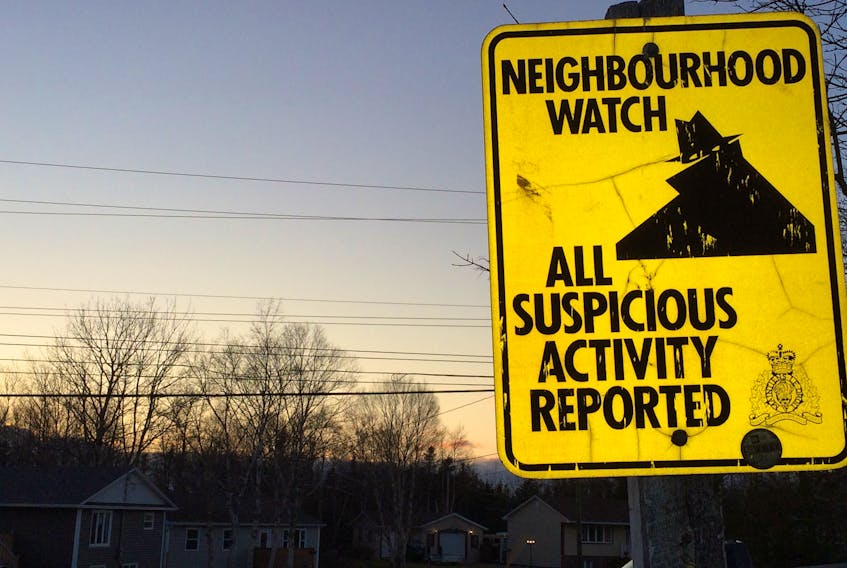GANDER, N.L. — The Town of Gander is trying to curb crime, but unless citizens take an active role, Gander Mayor Percy Farwell says it is hard to effect change.
The town, led by municipal enforcement, has been trying to establish a Neighbourhood Watch program, but progress has been slow.
Since the first meetings started taking place in 2017, only two areas of Gander have taken up the program.
Farwell calls the lack of response frustrating.
“It seems, in spite of the community efforts, people don’t want to come forward and get involved,” he said. “It’s one thing to want your community safe, but if you’re not prepared to play any part in that yourself you can’t expect either the municipal government or the provincial government to be able to go off and hire a bunch of people to do it for you.”
His response fell on the heels of the RCMP’S first quarter statistics indicating a nine per cent increase in the number of calls – 620 from January to March – over the previous year’s first quarter. There were nine confirmed break and enters, and 79 complaints of theft.
Related:
Gander working on Neighbourhood Watch
Gander break and enter victim speaks out
Addictions slowly contributing to upswing in Gander crime rates
Staff Sargent Roger Flynn understands the mayor’s frustration.
He took part in three of the sessions, in partnership with Municipal Enforcement.
“Attendance hasn’t been good,” Flynn said, noting less than a dozen people showing up to events.
“Typically what happens is things will go along for months where (it is) stable, nothing really major happens (crime wise), then we’ll run into a rash of property crimes …and it rears its head again.”
The call for programming, like Neighbourhood Watch, is again issued, he said, but again attendance is low.
Which, Flynn said, is unfortunate, because his involvement with the program in other areas of the country has been a positive one.
“There was one in Carbonear called Cabin Watch, and we reduced the level of cabin break ins. We went from close to 100 in one year, down to two,” he said. “It’s not people out patrolling, it’s neighbours looking out for neighbours.”
Flynn said the program has taken root in other areas of the province as well, noting St. John’s and Mount Pearl have established watch programs.
Looking at Gander’s population, he called the central Newfoundland the perfect size for neighbourhood watch.
“But we can’t seem to get the interest,” he said. “People still look at it as a policing issue, it’s a community issue, and police are a part of the community and they have a role to play, but our eyes and ears are different than the eyes and ears of a neighbour… the better bang for our buck is to have an engaged community that knows if something is just not right.”
The RCMP will continue to partner with Municipal Enforcement to establish the program in Gander.
Municipality advocating
There have been calls from the public for an increased RCMP presence and the establishment of around the clock policing. Farwell said council has advocated for the same services, and it continues to push for additional resources at the Gander detachment.
However, he also understands the constraints of working within an allotted budget.
“The reality is these things have to be funded and there isn’t an unlimited funding pot for enforcement,” he said. “That’s why we need to get the maximum out of the (policing staff) we have.”
To assist the RCMP, the town has four municipal enforcement officers dedicated to municipal regulations and the highway traffic act.
But the unarmed officers aren’t trained for criminal act response, and it doesn’t appear the town will be moving municipal enforcement in that direction.
“We are not the primary resource for policing,” Farwell said. “Municipalities do the best they can by obtaining resources – tax revenue – from its citizens to provide services that aren’t being providing by others.”
Farwell also expressed an interest in establishing partnerships for a grassroots approach to curb addiction.
“We are looking to advocate and partner with service providers such as Central Health and the Department of Health for an enhancement of services,” he said. “Can we do it on ourselves? of course not. Should we expect someone else to do it all for us? Of course not. We need to be doing our share with other entities.
“We may not have primary responsibility in either case (law enforcement and health care), but we have an obligation on behalf of our citizens to use our resources as best we can to try and facilitate things that will improve the situation.
“Just like every individual citizen should understand that they have a responsibility to play their part.”









